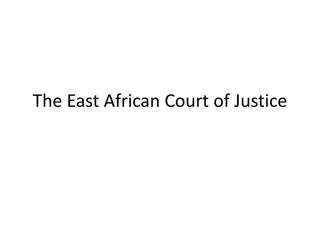Treaty of Allahabad: Historical Agreement Between Shah Alam II and East India Company
The Treaty of Allahabad, signed in 1765, marked the beginning of British rule in India. Shah Alam II granted Diwani rights to the East India Company, allowing them to collect taxes in the eastern provinces. The agreement also involved territorial exchanges and financial obligations, altering the political landscape of the region significantly.
Download Presentation

Please find below an Image/Link to download the presentation.
The content on the website is provided AS IS for your information and personal use only. It may not be sold, licensed, or shared on other websites without obtaining consent from the author.If you encounter any issues during the download, it is possible that the publisher has removed the file from their server.
You are allowed to download the files provided on this website for personal or commercial use, subject to the condition that they are used lawfully. All files are the property of their respective owners.
The content on the website is provided AS IS for your information and personal use only. It may not be sold, licensed, or shared on other websites without obtaining consent from the author.
E N D
Presentation Transcript
The Treaty of Allahabad was signed on 12 August 1765, between the MughalEmperor Shah Alam II, son of the late Emperor Alamgir II, and Robert Clive, of the East India Company, as a result of the Battle of Buxar of 22 October 1764.
The Treaty marks the political and constitutional involvement and the beginning of British rule in India. Based on the terms of the agreement, Alam granted the East India Company Diwani rights, or the right to collect taxes on behalf of the Emperor from the eastern province of Bengal- Bihar-Orissa.
Thus East India Company were appointed as the imperial tax collector for the Eastern province (Bengal- Bihar-Orissa). These rights allowed the Company to collect revenue directly from the people of Bengal, Bihar and Orissa. In return, the Company paid an annual tribute of twenty-six lakhs of rupees (equal to 260,000 pounds sterling) while securing for Shah Alam II the districts of Kora and Allahabad.
The accord also dictated that Shah Alam be restored to the province of Varanasi as long as he continued to pay certain amount of revenue to the Company. Awadh was returned to Shuja-ud-Daulah, but Allahabad and Kora were taken from him. The Nawab of Awadh also had to pay fifty lakhs of rupees as war indemnity to the East India Company.
Shah 'Alam conveying the grant of the Diwani to Lord Clive
The Nawab of Awadh, Shuja ud Daulah, was made to pay a war indemnity of 5 million rupees to the Company. Moreover, the two signed an alliance by which the Company promised to support the Nawab against an outside attack provided he paid for services of the troops sent to his aid. This alliance made the Nawab dependent on the Company. This was a turning point in Indian history.























